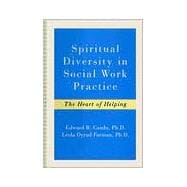In Spiritual Diversity in Social Work Practice, Edward R. Canda and Leola Dyrud Furman introduce their breakthrough work on the importance of spirituality in social work teaching and practice. In this long-awaited textbook these leaders in socia

In Spiritual Diversity in Social Work Practice, Edward R. Canda and Leola Dyrud Furman introduce their breakthrough work on the importance of spirituality in social work teaching and practice. In this long-awaited textbook these leaders in socia
| Contents | |
| Acknowledgments | |
| A Note to the Reader | |
| Introduction | |
| The Heart of Helping | |
| Principles That Guide the Writing of This Book | |
| A Comparative Educational Approach | |
| Preview of Chapters | |
| Exercises | |
| Central Values And Concepts For Spiritually Sensitive Social Work | |
| Compassion, The Call To Service, And Ethical Principles For Social Work | |
| Introduction | |
| The Virtue of Compassion in Professional Social Work | |
| Symbols of Compassion in Religious Traditions | |
| A Common Heart of Compassion | |
| Ethical Principles for Spiritually Sensitive Social Work | |
| Summary | |
| Exercises | |
| The Meaning And Significance Of Spirituality | |
| Introduction | |
| The Challenges of Defining Spirituality | |
| An Open Conceptualization of Spirituality | |
| Responding to the Spirituality Debate | |
| Summary | |
| Exercises | |
| Exploring Spiritual Diversity For Social Work Practice | |
| Human Diversity, Spirituality, And Social Work Practice | |
| Introduction | |
| History of Spiritual Diversity in the United States | |
| History of Connections Between Spirituality and Social Work | |
| Ethnic Diversity and Spirituality | |
| Women and Spirituality | |
| Homosexuality, Sexual Orientation Diversity, and Spirituality | |
| Summary | |
| Exercises | |
| Religious Perspectives On Social Service And Their Insights For Social Work Practice | |
| Introduction | |
| Buddhism and Social Service | |
| Christianity and Social Service | |
| Hinduism and Social Service | |
| Islam and Social Service | |
| Judaism and Social Service | |
| Shamanism and Social Service | |
| Summary | |
| Exercises | |
| Nonsectarian Spiritual Perspectives, Comparisons, And Implications For An Inclusive Approach | |
| Introduction | |
| Existentialism and Social Service | |
| Transpersonal Theory and Social Service | |
| Comparison of Spiritual Perspectives on Service | |
| Engaging in Dialogue and Cooperation Across Spiritual Perspectives | |
| Summary | |
| Exercises | |
| Spiritually Sensitive Social Work In Action | |
| Creating A Spiritually Sensitive Context For Practice | |
| Introduction | |
| The Helping Relationship and ProcessA Holistic Approach to Social Work Practice | |
| Summary | |
| Exercises | |
| Understanding And Assessing Spiritual Development | |
| Introduction | |
| Spiritual Development and Everyday Life | |
| Spiritual Emergence and Emergencies | |
| Spiritual Emergence Throughout the Life Cycle | |
| Assessment over the Life Span | |
| Topics for Assessment of Transpersonal Experiences | |
| Summary | |
| Exercises | |
| Understanding And Assessing Therapeutic Process, Spiritual Activities, And Ethical Issues | |
| Introduction | |
| Social Work Practice as a Transformational Process | |
| Ethical Guidelines for Using Spiritually Based Activities | |
| Assessing Spiritual Propensity | |
| Assessing Psychosocial Impacts of Participation in Spiritual Groups | |
| Summary | |
| Exercises | |
| Spiritually Sensitive Practice Skills And Techniques | |
| Introduction | |
| Multicultural Teamwork for Spiritually Sensitive Practice | |
| Spiritual Growth-Oriented Helping Techniques | |
| Spirituality and Managed Care | |
| Spirituality and Community-Involved Practice | |
| Summary | |
| Exercises | |
| Discussion Guide For Assessing Spiritual Propensity | |
| Methodological Summary For National Survey Of Nasw Members On Spirituality In Practice | |
| References | |
| Further Information on Spiritual Diversity in Social Work | |
| Index | |
| Table of Contents provided by Publisher. All Rights Reserved. |
The New copy of this book will include any supplemental materials advertised. Please check the title of the book to determine if it should include any access cards, study guides, lab manuals, CDs, etc.
The Used, Rental and eBook copies of this book are not guaranteed to include any supplemental materials. Typically, only the book itself is included. This is true even if the title states it includes any access cards, study guides, lab manuals, CDs, etc.